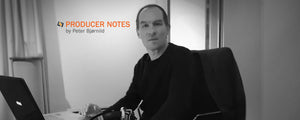Recording the Feenbrothers
"Life is a lot like jazz; it’s best when you improvise." - George Gershwin
Our second One Mic recording, Feenbrothers play Dace Brubeck, live at the MCO, wasn't planned as such, which is why the Gershwin quote headlining this blog is so befitting. The Brubeck concert was scheduled long before we even thought about recording using only the Josephson C700S multi-capsule microphone. But what happened is a kind of follow-up to the story behind our first One Mic recording: Carmen Gomes Inc.'s 'Don’t You Cry'.
Paul and Mark van der Feen had heard the initial trial recording with the Josephson C700S and really liked the sound. So, when the four brothers arrived for the sound check, they insisted on recording that way too.
Sound Liaison head-engineer Frans de Rond was very skeptical; he thought the Brubeck repertoire, with its dynamic variation between tunes, wouldn't suit such a minimalistic approach. But Paul reassured him: “Find the sweet spot, and we’ll play in balance.”
It took about three hours to complete the sound stage, carefully moving each instrument closer or further away, as well as left and right in relation to the microphone. But the time spent was well worth it. The sound coming from the studio monitors had astonishing presence and realism.
On this recording, the audience is more present than in our other live recordings from Studio 2. We usually prefer a smaller audience of no more than 80 people for flexibility. That number leaves us room to move around, change a cable, or reposition the microphone if needed. But fate intervened: the computer system keeping count of tickets sold had a breakdown, and instead of 80 tickets, 110 were sold. Extra seats were brought in, placing the audience very close to the band. And now with 110 people, the atmosphere was electrifying. As Frans noticed during the extended applause when the Feenbrothers entered the stage: “Look at that phase meter; it is practically straight in the middle, a phase-coherent applause!”
The four brothers are very different personalities, but when they start playing, anything seems possible. A good example is in the piano solo on 'It’s Raggy Waltz', where Mark’s iPhone, used for reading the setlist, falls into the piano and creates a distortion effect as it vibrates on the strings. Somehow, the flow of the solo isn’t interrupted. The incident is merely a bump in the road, sending Mark down a different path, closely followed by Clemens and Matthijs. In 'Gone With the Wind', Paul starts off a cappella, inspired on the spot, forcing his brothers to create a completely different arrangement. Such pure joy of playing is infectious. Listen to 'Unsquare Dance', where the audience joins in clapping along in 7/4 meter!
The Feenbrothers are an institution on the European music scene. They started as a family band but soon were also in great demand individually, called upon by the likes of the Royal Concertgebouw Orchestra, The Metropole Orchestra, Jazz Orchestra of the Concertgebouw, Toots Thielemans, Han Bennink, Caro Emerald... the list could go on for several pages.
Each brother has his own musical tastes, and they don't always agree on what constitutes great music, but one exception is Dave Brubeck. When looking for a theme to bring the Feenbrothers back together for a small tour and this live recording, Brubeck’s music was an obvious choice.
The Feenbrothers play Dave Brubeck has become a modern classic, considered by many a benchmark for audiophile live recordings, with superb reviews from the audiophile press.
"The One mic recording with the Feenbrothers playing Brubeck is incredible. Superb staging depth and over all a sense of being there.
Highly recommended." - head-fi
"Superb musicianship and fantastic sound. Dynamics, tone, timbre and soundstage are all superb. Instrument placement in the sound field is spot on. This is a superb recording all around and is one that I can recommend for all
jazz fans." - Audiophile style
"I found the 96 kHz files to be excellent, but by comparison the 352.8 kHz originals have a bit more air and space in the sound." - audioexpress.com
Video:

